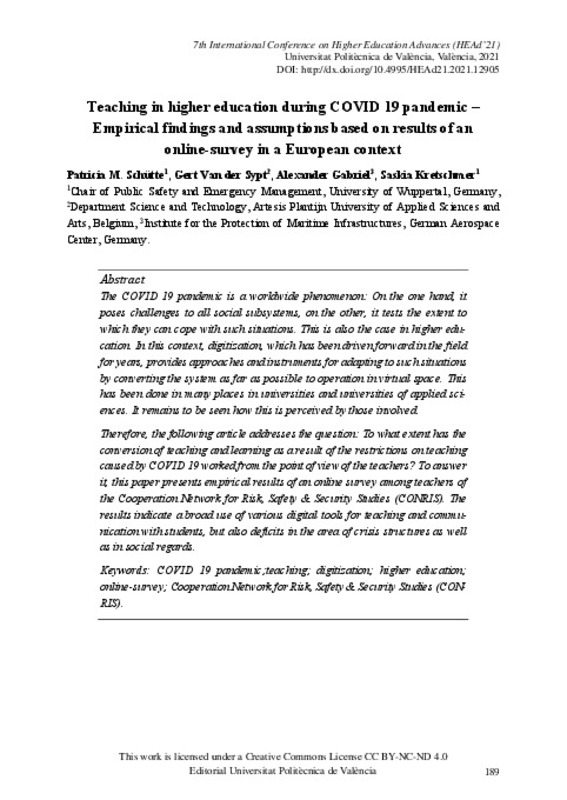JavaScript is disabled for your browser. Some features of this site may not work without it.
Buscar en RiuNet
Listar
Mi cuenta
Estadísticas
Ayuda RiuNet
Admin. UPV
Teaching in higher education during COVID 19 pandemic – Empirical findings and assumptions based on results of an online-survey in a European context
Mostrar el registro sencillo del ítem
Ficheros en el ítem
| dc.contributor.author | Schütte, Patricia
|
es_ES |
| dc.contributor.author | Van der Sypt, Gert
|
es_ES |
| dc.contributor.author | Gabriel, Alexander
|
es_ES |
| dc.contributor.author | Kretschmer, Saskia
|
es_ES |
| dc.date.accessioned | 2021-09-13T08:11:26Z | |
| dc.date.available | 2021-09-13T08:11:26Z | |
| dc.date.issued | 2021-07-26 | |
| dc.identifier.isbn | 9788490489758 | |
| dc.identifier.issn | 2603-5871 | |
| dc.identifier.uri | http://hdl.handle.net/10251/172179 | |
| dc.description.abstract | [EN] The COVID 19 pandemic is a worldwide phenomenon: On the one hand, it poses challenges to all social subsystems, on the other, it tests the extent to which they can cope with such situations. This is also the case in higher education. In this context, digitization, which has been driven forward in the field for years, provides approaches and instruments for adapting to such situations by converting the system as far as possible to operation in virtual space. This has been done in many places in universities and universities of applied sciences. It remains to be seen how this is perceived by those involved. Therefore, the following article addresses the question: To what extent has the conversion of teaching and learning as a result of the restrictions on teaching caused by COVID 19 worked from the point of view of the teachers? To answer it, this paper presents empirical results of an online survey among teachers of the Cooperation Network for Risk, Safety & Security Studies (CONRIS). The results indicate a broad use of various digital tools for teaching and communication with students, but also deficits in the area of crisis structures as well as in social regards. | es_ES |
| dc.format.extent | 9 | es_ES |
| dc.language | Inglés | es_ES |
| dc.publisher | Editorial Universitat Politècnica de València | es_ES |
| dc.relation.ispartof | 7th International Conference on Higher Education Advances (HEAd'21) | |
| dc.rights | Reconocimiento - No comercial - Sin obra derivada (by-nc-nd) | es_ES |
| dc.subject | Higher Education | es_ES |
| dc.subject | Learning | es_ES |
| dc.subject | Educational systems | es_ES |
| dc.subject | Teaching | es_ES |
| dc.subject | COVID-19 pandemic | es_ES |
| dc.subject | Digitization | es_ES |
| dc.subject | Online-survey | es_ES |
| dc.subject | Cooperation Network for Risk | es_ES |
| dc.subject | Safety & Security Studies (CONRIS) | es_ES |
| dc.title | Teaching in higher education during COVID 19 pandemic – Empirical findings and assumptions based on results of an online-survey in a European context | es_ES |
| dc.type | Capítulo de libro | es_ES |
| dc.type | Comunicación en congreso | es_ES |
| dc.identifier.doi | 10.4995/HEAd21.2021.12905 | |
| dc.rights.accessRights | Abierto | es_ES |
| dc.description.bibliographicCitation | Schütte, P.; Van Der Sypt, G.; Gabriel, A.; Kretschmer, S. (2021). Teaching in higher education during COVID 19 pandemic – Empirical findings and assumptions based on results of an online-survey in a European context. En 7th International Conference on Higher Education Advances (HEAd'21). Editorial Universitat Politècnica de València. 189-197. https://doi.org/10.4995/HEAd21.2021.12905 | es_ES |
| dc.description.accrualMethod | OCS | es_ES |
| dc.relation.conferencename | Seventh International Conference on Higher Education Advances | es_ES |
| dc.relation.conferencedate | Junio 22-23, 2021 | es_ES |
| dc.relation.conferenceplace | València, Spain | es_ES |
| dc.relation.publisherversion | http://ocs.editorial.upv.es/index.php/HEAD/HEAd21/paper/view/12905 | es_ES |
| dc.description.upvformatpinicio | 189 | es_ES |
| dc.description.upvformatpfin | 197 | es_ES |
| dc.type.version | info:eu-repo/semantics/publishedVersion | es_ES |
| dc.relation.pasarela | OCS\12905 | es_ES |








